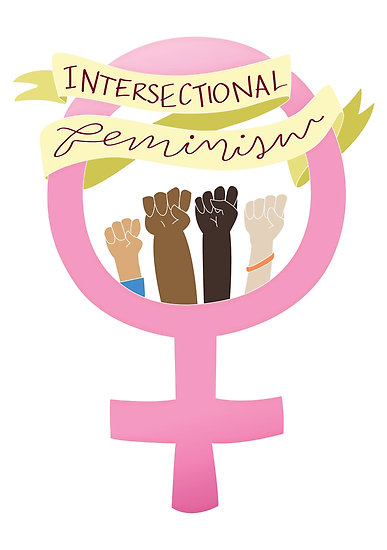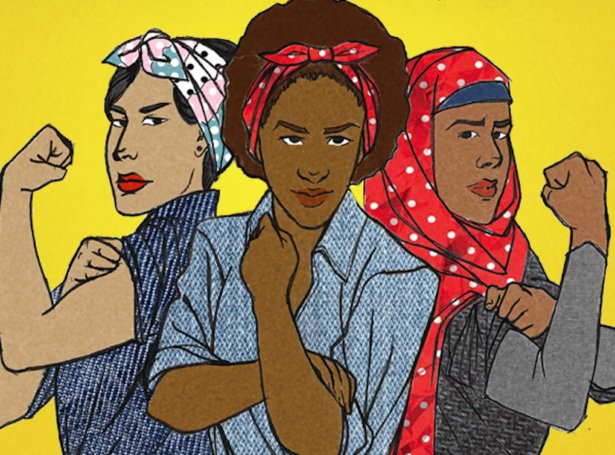GRSJ224/IntersectionalFeminism
Introduction
There is a myth of the cohesive feminist group. Before the decentralization of the government and contemporary move towards neoliberalism, minority groups who wanted their concerns to be heard had to petition for an audience with the government
The voices with the right language (English) and ability to communicate their concerns were the most heard. Therefore, the prominent concerns which are brought up in feminist discourse are the concerns of middle-to-upper class, white, cis women. However, the manner in which different groups of women are oppressed drastically changes when we begin to speak about lower class women, women of colour and trans women. The gendered issues which upper-class white women petition for are significant, important issues. However, they are not the only gendered problems and it is important to acknowledge the voices of women whose feminist concerns are often unheard.
Upper-Class White Women
Upper-class white women have never suffered the physical discomforts of starvation or homelessness. But despite a life of physical comfort, these women are so hedged in by the cultural expectations of a lady of their class that they have historically suffered psychological maladies.
Historically, upper class women have been diagnosed in an alarmingly large degree to suffer from the anxiety disorders of hysteria or neurasthenia. Neurasthenia is characterized by balls of excessive and unprecedented weeping. It can be assumed that what afflicted them, particularly the bright women, is unbelievable boredom. They had nothing to do and could never feel that they accomplished anything. They had food and a bed to go to at the end of the day, they were very well taken care of. But they also had no intellectual fulfillment.
This is because for an upper class woman to continue working after marrying her husband, it would reflect very poorly on her husband. He would be considered ‘incapable of keeping her’. When women want to do something, men have historically considered this to be the woman disrespecting them. The reputation cultivated against women of being flimsy and shallow is a highly gendered microaggression. The arrangement is that the husband gives the woman household money and she is supposed to keep the accounts. There are many stories where the woman is supposed to present the accounts, and claim to have bought parsley for $200. “Feminine logic” is the term used to explain how women spend the money. Women were historically criticized and disparaged for having an easy and work free life, even though they had no opportunity to pursue work. Women were often resented because although at some point they could volunteer, they have never been conscripted or required to fight in wars. This is greatly unjust, because women were never give the option to work or fight, and yet they were resented and disparaged for this. The stereotype of the woman who is airheaded, flimsy and money-obsessed without ever working had surpassed the constricts of history and seeped into contemporary perceptions and microaggressions against upper class women today.
Women of Colour
There is a glaring lack of representation within media of women of colour in their humanity. Women of colour are often hypersexualized and portrayed as a representation of the male gaze. In this way, the literal spaces of ethnic female bodies are objectified. Ethnic female bodies, especially Latina, African and East Asian women often have their literal bodies turned into spaces of sexual vulgarization.
Bodies which physically deviate from the slim, small breasted, tall white female bodies are often considered pretty in an objectified, exotic and overtly sexualized manner and perceived without the respectful appreciation of the cultural image of white women.
Lower Class Women
A popular discourse made by upper class women on behalf of lower class women, is the need for more areas of employment to be opened up so that women can earn a living for themselves. An issue arises when expectations of fragility, emotional hypersensitivity and physical weakness are imposed on cis women. As a result of these gendered expectations, there is a popular belief that women cannot factually be as efficient as men in certain work areas. Lower-and-middle class women struggle to feel respected in male dominated, ‘boys club’ workforces such as firefighting areas, police departments and construction work.
Although there are exceptions, women who go into sex work or become strippers are largely underprivileged, lower class women. Women who are employed in the sex trade are victimized by aggressive and violent criminal acts to a degree much higher than women employed in jobs which are considered respectable. The singling out and victimization of female sex workers is a highly gendered problem. This arises in part, because of a sexist belief that women who are sexual are perceived to be unrespectable and less worthy of human decency.
Trans Women
The issues which trans women face are in direct opposition to issues which cis women face, but they still originate from the concept of the enforced gender binary. Cis women are often hedged in and limited because they are believed to be inherently weaker and more mentally, physically and emotionally fragile than men. Trans women also experience sexist microaggressions. Some narratives aggressively keep to the gender binary even while accepting trans women. They state that women have these feminine characteristics and men have inherently masculine characteristics. The microaggression exists when trans women are assimilated into the gender binary by being portrayed or encouraged only to display feminine behaviors. In consequence, trans women are problematically asked to validate their gender identity by being encouraged to subscribe to stereotypes of femininity.
References
Burke, Penny Jane. Difference in higher education pedagogies: gender, emotion and shame. 2017. Gender and Education 29:4, pages 430-444.
Gregory, Raymond F. Women and Workplace Discrimination: Overcoming Barriers to Gender Equality. Rutgers University Press, New Brunswick, N.J, 2003.
Hong, Grace K. The Ruptures of American Capital: Women of Color, Feminism, and the Culture of Immigrant Labor. University of Minnesota Press, Minneapolis, 2006.
Prochuk, Alana. "From the Monster to the Kid Next Door: Transgender Children, Cisgender Parents, and the Management of Difference on TV." Atlantis, vol. 36, no. 2, 2014, pp. 36.
UNESCO. Publications in Education. Girls’ and Women’s Right to Education. , 2014. Sweetman, Caroline. Women, Employment and Exclusion. Oxfam, Oxford, UK, 1996.

